Alexandria City Council candidate Abdel Elnoubi has been making legislative waves recently as a member of the School Board, and says residents should expect the same kind of results if he gets elected.
Elnoubi is one of 11 Democrats running to fill six seats on City Council, including four incumbent Council members running for reelection in the Democratic primary on June 18. The field also includes Jacinta Greene, a fellow School Board Member.
Elnoubi is a freshman politician sworn in virtually during the pandemic in 2021. The last several years meant contending with staffing shortages, learning loss, school safety and budgeting issues. He says that alleviating staffing woes is an important solution for the school system, and consequently added a $4.2 million bonus in the ACPS budget request to the City Council for staff who were excluded from step increases in fiscal year 2021.
That move, and other additions by the School Board, will likely result in a residential tax increase during an election year.
“It’s your decision to decide whether you want to raise taxes or not,” Elnoubi told City Council last month. “If you do that, if you decide to raise taxes, I’m 100% with you.”
Elnoubi, an engineering project manager for the Washington Metropolitan Area Transit Authority, also made big changes to the ACPS collective bargaining resolution. Most notably, he gained support to eliminate a voting threshold for ACPS staff to establish unions to begin the bargaining process with the school system.
“We just can’t pay our teachers enough, so it’s personal for me,” Elnoubi said. “In my early days at Metro, I was a young engineer making $66,000. I could hardly afford to live in Alexandria. My family was growing. We (at WMATA) got a raise because the union had a new agreement… Not just that, they got us back pay, and that made a significant change in my life. It made me feel more financially secure. Now all of a sudden I have extra money for savings, I’m making a little bit more money with this newborn that I just had. So, I saw firsthand the impact of being part of a union and having a collective bargaining agreement.”
Elnoubi lives in the Landmark area with his wife and two children.
Early on in his School Board tenure, Elnoubi said he wouldn’t be a “rubber stamp” for former ACPS Superintendent Gregory Hutchings, Jr., and frequently went against established Board practices by speaking with the press.
“I believe in transparency, and I made it a point to be accessible to the press,” he said. “Because I came to this country for Democracy, for opportunity, for the things that make this country great, that we can hold government accountable.”
Born in Chicago, Elnoubi lived in Falls Church until he was eight years old, and then moved with his family to Alexandria, Egypt. He says his return to America and political aspirations in Alexandria, Virginia, makes for a literal “Tale Of Two Cities,” where quality of life issues stand in stark contrast.
“The police there (in Egypt) don’t work for the people,” Elnoubi said. “They’re an instrument of the regime to crush dissent… Education is totally underfunded, especially public schools. Teachers are paid very badly and can’t afford basic life necessities.”
At 21, Elnoubi returned to the U.S. after three years of college in Egypt and transferred to the City College of New York, where he earned a Bachelor’s Degree in mechanical engineering. He later earned a Master’s in engineering management from George Washington University, and moved to the city in 2012. Prior to his election in 2021, he was also the president of the PTA at Samuel W. Tucker Elementary School and was a member of the city’s Community Criminal Justice Board and the Building Code Board of Appeals.
Elnoubi is Muslim and says he was inspired to run for office after former President Donald Trump was elected and signed an executive order initiating a travel ban to seven Muslim countries.
“My kids know no other country but the U.S., and I didn’t want them growing up in their own country feeling they do not belong or were being discriminated against,” Elnoubi said. “I started talking to people, and they advised me to join the Democratic Committee, to become a grassroots activist, to get involved more than I was. I did.”
He continued, “We can’t take this Democracy for granted. I’ve seen what happens when you don’t have Democracy. Corruption, bad quality of life, you can’t hold government accountable, you’re risking your life just by speaking up. And now I’m like, oh my God, could that happen here? And guess what? We found the answer four years later. It almost happened. You almost had a coup four years later.”
Elnoubi says that he’s a goal-oriented engineer, setting achievable benchmarks and closely measuring progress with data. He said that the failed Potomac Yard arena deal lacked safeguards to shield Alexandria residents from hundreds of millions of dollars in financial liabilities “in the event of unrealized projections.”
“The deal neglected the needs of our commuters posing adverse implications through the anticipated surge in traffic, compounded by insufficient state funding allocated for essential public transportation enhancements aimed at mitigating such concerns,” Elnoubi said. “The deal’s environment details were lacking. The deal failed to prioritize the welfare of our workforce with lack of sufficient labor protections and commitments to uphold union standards.”
On affordable housing, he said that he will use “zoning and permitting regulations, tax incentives, and partnerships” to allow residents of all income levels to live in the city.
Elnoubi admits that he’s got his work cut out for him in this primary election. He also says that his experience on the Board sets him apart.
“I’ve seen how hard the work is, how much effort and dedication it takes,” he said. “I love to roll up my sleeves and get involved.”
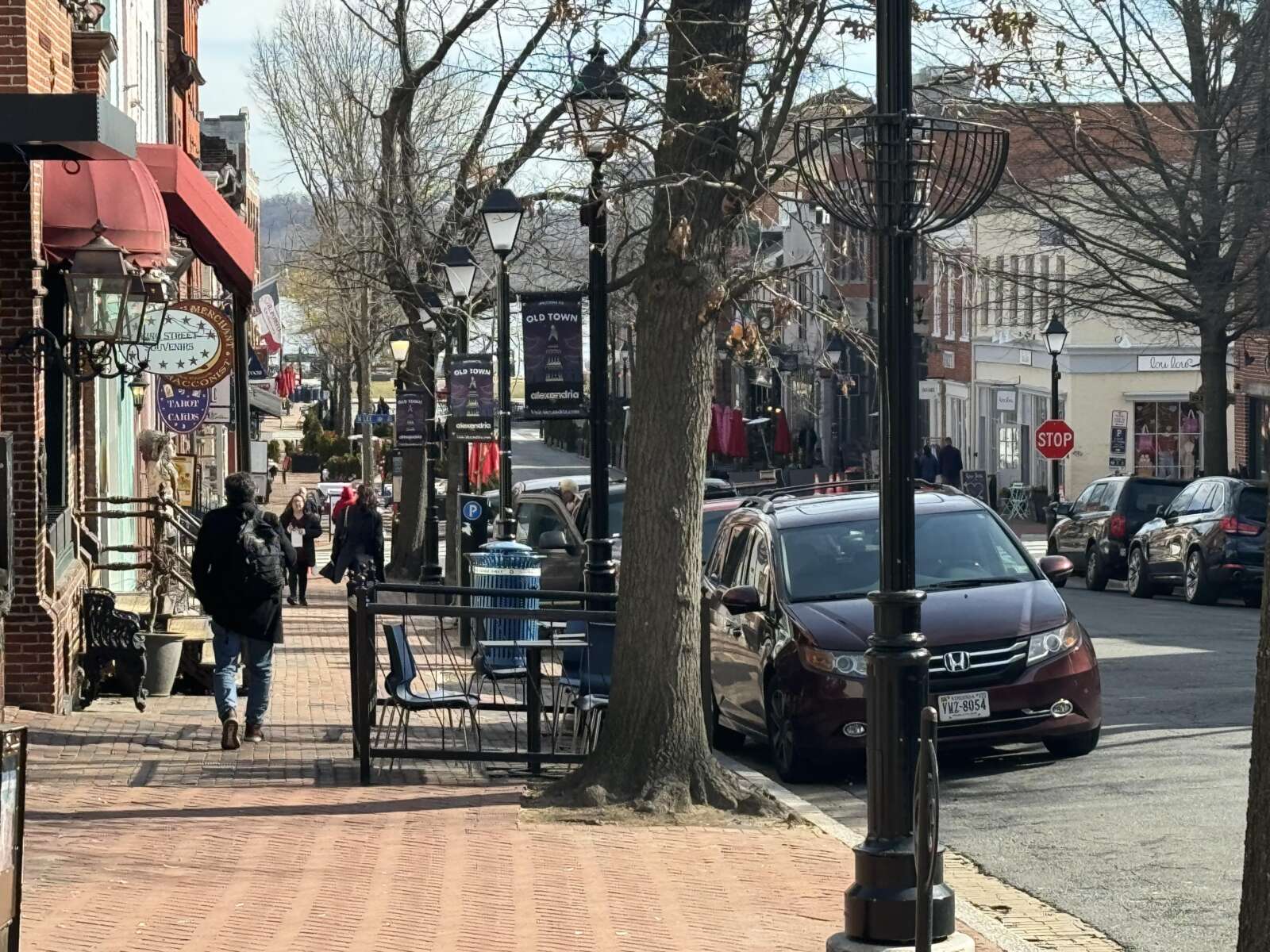
(Updated 3:40 p.m.) To get a business improvement district (BID) approved for Old Town, proponents will need the support of 60% of properties in the proposed zone. But a new change could cut property owners who don’t engage at all out of that 60% requirement.
City Council member John Chapman said after outreach was done for the Old Town BID there were over 200 property owners that never responded either in favor or against the proposal.
Currently, not weighing in on the project is tantamount to not supporting it.
“Those business owners wanted to look at adjusting the way we were doing counting to not qualify those individuals for counting toward the percentage of property owners that were either for or against the BID,” Chapman said.
While the proposed BID would get a leg up by not counting absent property owners in that 60% requirement, previous attempts at getting the BID going have faced active community backlash at times.
While many on the City Council expressed their support for that change, Chapman said the city should do more outreach to those property owners first for “another opportunity to have their voices heard for or against the creation of a business improvement district.”
“The goal is to engage those individuals, if they remain not voting at all, that their property would not count toward whether or not we do a BID,” Chapman said. “We do not want those who do not engage with this process to count against this process.”
Others on the City Council generally expressed support for the change. City Council member Sarah Bagley said she’s heard from businesses that support the idea of the BID but have absentee owners who don’t weigh in one way or the other.
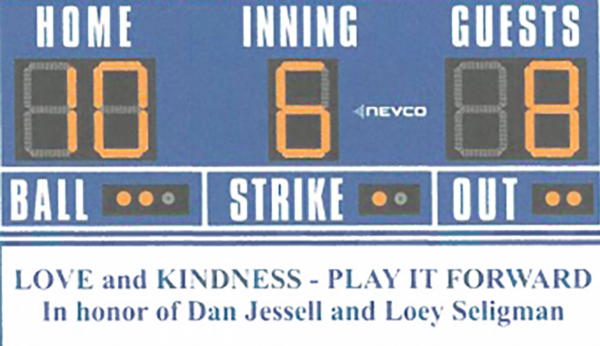
A local nonprofit is donating a $50,000 scoreboard at the Kelley Cares Miracle Field outside the Nannie J. Lee Memorial Recreation Center in Old Town.
The scoreboard is a gift to the city from the Miracle League of Alexandria and it will be presented to City Council for approval on April 2. Additionally, the $3,000 installation for the scoreboard’s support beams is being donated by the Simpson Development Company.
MLA built the synthetic baseball diamond in partnership with the Kelley Cares Foundation in 2012. The field is next to the Ruthanne Lodato Memorial Playground for people with special needs.
Kelley Cares Miracle Field is named in honor of Kelley Swanson, a T.C. Williams High School student who died after a graduation trip in 2005.
The scoreboard was paid for by Sheri and Mark Jessell in honor of their 18-year-old son, Dan, who loved baseball and died in 2018, and Sheri Jessell’s sister, Loey Seligman, who died in 2020.
“The scoreboard will enhance the experience for players in the Miracle League, as well as for others who use the field,” MLA Board Chair Mac Slover wrote in a letter to the city. “The scoreboard will be installed beyond the right field fence and will be 10-feet-wide and 16-feet-tall. It will be raised another six feet so that it can be above the sightlines of the existing fence.”
The Jessell family lives in Florida and were inspired to donate to the Alexandria nonprofit after seeing an MLA video. At first, MLA received a $50 donation from the Jessell family in last year’s Spring2ACTion fundraiser, and after corresponding with the family, Slover was informed months later that the family wanted to make a substantial donation.
“In 2020, we had done a video about how much we missed our players because of Covid, and it brought her (Sheri Jessell) to tears,” Slover said. “She and her family wanted to donate $50,000, and we were able to get the scoreboard, which has been a dream of mine since we built the field in 2012.”
Slover wants to install the scoreboard in August and dedicate it in early September.
Alexandria City Council members and candidates are opening up about their positions on the city backing out of the Potomac Yard arena deal.
Mayor Justin Wilson said that the city will be spending a lot of time unpacking what led to the announcement that it was backing out of a plan to move the Washington Wizards and Capitals from D.C. to a new arena with an entertainment district in the city’s Potomac Yard neighborhood.
The deal is now a historic defeat, joining the failed attempt in the 1990s to build a stadium for the Washington Redskins (now Washington Commanders) at Potomac Yard.
“We’ll spend some time unpacking all of this,” Wilson told ALXnow. “But in the end, this proposal got caught up in some powerful politics in Richmond. Now, as a result of those very same politics, some very significant priorities of Alexandria are very vulnerable in Richmond. That’s a shame.”
Wilson said those components of the state budget include funding for the Washington Metropolitan Area Transit Authority, education and public safety. Wilson was enthusiastic about the deal since it was announced Dec. 13, remaining steadfast in his support of its economic potential until yesterday’s announcement. Wilson is currently vacationing with his family and has been responding to the situation from Greece.
“Gun legislation has already been vetoed, and I imagine many, many vetoes to go,” Wilson said.
All of City Council sat on stage alongside Wilson, Governor Glenn Youngkin and Monumental Sports & Entertainment owner Ted Leonsis at the surprise announcement on Dec. 13 in Potomac Yard. Youngkin characterized the move as a once-in-a-lifetime opportunity, wanting the arena to open next door to the Potomac Yard Metro station in 2028.
The $2 billion project stalled in the Democrat-controlled Virginia State Senate, held up by Senate Appropriations Committee Chair Sen. Louise Lucas, who refused to include it in the state budget. This week, Lucas said that Leonsis could pay for the entire project himself instead of relying on $1.5 billion in bond financing from Virginia taxpayers.
Former Alexandria Mayor Allison Silberberg joined the Coalition to Stop the Arena at Potomac Yard in Richmond to protest the move during the General Assembly’s session earlier this month. She said that the city backing out of the deal was a great relief.
“The financial risks were terrible for the Commonwealth and our city, as well as the traffic impacts that would have overwhelmed our city over 275 nights a year,” Silberberg said. “I hope the city will now focus its economic development vision on more compatible uses for this property. As I have said often since 2018, I envision a tech corridor with the Virginia Tech Innovation Campus as the anchor and catalyst in addition to mixed use development.”

Alexandria City Manager Jim Parajon is asking City Council to increase penalties for late personal property tax payments.
The news comes as City Council considers a real estate tax increase to fund a significant budget request from the Alexandria School Board.
Parajon wants to increase the late payment penalty from a flat rate of 10% to “a rate of 10% if paid within 30 days 20 after the due date, and 25% if paid more than 30 days after the due date,” according to the proposal that Council will receive on Tuesday, April 2.
The city’s personal property tax rate is $5.33 per $100 of the assessed value of vehicles, and $3.55 for vehicles retrofitted to accommodate disabled drivers.
The following residents can get an exemption on personal property taxes:
- Active-duty U.S. military personnel and their spouses
- Antique car owners
- Member of Congress and their spouses
- Foreign diplomats
- Disabled U.S. military veterans
Personal property tax bills are mailed in the summer and payments are due Oct. 5.
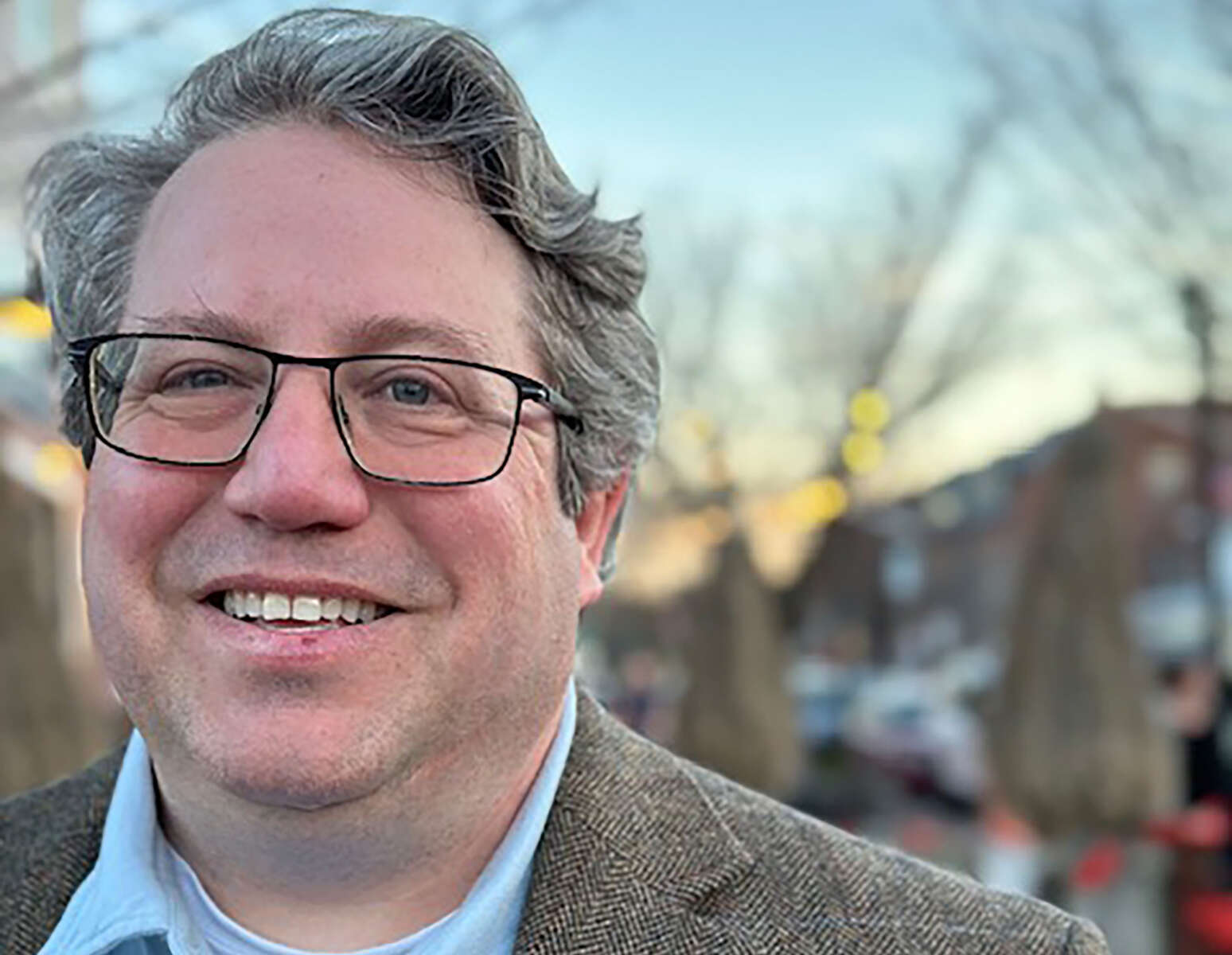
Jonathan Huskey’s campaign to be a member of Alexandria’s City Council is centered around his opposition to the Potomac Yard arena development.
Huskey says that the city government failed residents with last December’s surprise announcement that Monumental Sports & Entertainment reached a deal with Governor Glenn Youngkin to move the home of the Washington Wizards and Washington Capitals from D.C. to Alexandria’s Potomac Yard neighborhood.
“Certainly the governor is the main backer of this idea, but our Council and our mayor deserve to be in the storyline here,” Huskey said. “They are major players in the way that this has gone down, and in the way that there has been a lack of transparency.”
The $2 billion arena is currently at an impasse within the Virginia General Assembly, where Senate Democrats led by Sen. Louise Lucas (D-18) refused to include it in the state budget. Local legislators contend that Youngkin hasn’t negotiated with Democrats on the issue, and Huskey says the deal highlights a lack of transparency and accountability in the deal-making process.
“I’m stepping up to say we’ve got to have this debate in public,” Huskey said. “We’ve got to talk about it.”
Huskey says that the city did not adequately prepare, consult or provide residents with rationale for the project.
“That has really soured this in the eyes of our city, the legislature, the region,” he said. “So, I’m running because this cannot happen again, and we can’t be divided by a Council cutting deals with billionaires before they talk to their own constituents or the people who live within eyeshot of this thing.”
Huskey is the communications director at the State Revenue Alliance and lives with his wife and two children in Warwick Village, which is next door to Del Ray and near Potomac Yard. A native of Salina, Kansas, he has a degree in political science and government from the University of Kansas and has lived in Alexandria for 12 years.
“I know I’ve got a lot to learn about some of the various city departments, but I am certainly not a novice,” he said. “I am a policy professional. I know local and state government, how it works, and how to get things done. I think I’ll be ready to govern on day one and I’m going to embark on a lot of meetings with the police department and parks department and city boards to get an understanding where they’re coming from so I’ll be knowledgeable come the start of my tenure on council.”
He’s also never served on a city board or commission, and says he never found issue with City Council’s handling of large development deals until the arena plan surfaced. Since then he’s been a vocal member of the Coalition to Stop the Potomac Yard Arena.
“I have generally been supportive of this council and mayor’s decisions on development,” Huskey said. “I’ve not been an activist around any of the other debates that have happened around development, but this one is different for me.”
Huskey said that he started to consider a Council run last month when there were not more anti-arena candidates on the ballot. Currently, Charlotte Scherer is only other vocal anti-arena candidate running for Council, as are mayoral candidates Vice Mayor Amy Jackson and Steven Peterson.
“It’s not personal,” Huskey said. “I’m not upset at anybody in any personal way, but I do think this was a big boo-boo by the City Council and that it does show that there is some change that needs to happen at City Hall.”
Huskey is in favor of creating a ward system for City Council, and says that the city should get independent studies on major development proposals. By the end of his term, if elected, he says that Council should lobby Richmond for a more “progressive” tax structure that provides more revenue for schools.
“I can be part of the solution where we can actually fund the things that we need without deals like the Potomac Yard arena,” Huskey said.
Huskey also questions revenue projections for the project, and says that Youngkin made the deal because of the fiscal cliff the state faces with federal Covid relief funds drying up next year. He said that City Council made a choice to latch onto the project to solve its financial woes.
“They made a choice to latch onto this project built by a Republican governor and a billionaire who wants to move a team four miles for what?” Huskey said, adding that Monumental owner Ted Leonsis had an opportunity to get a “mini city” built by taxpayers. “Nobody asked for it.”
Huskey continued, “I fundamentally also think that is morally wrong, that they would even entertain such a thing. It is unjust to seek billions in public financing for a billionaire who has access to all of the money that would be needed to build that stadium and the facilities around it. He can pay for this thing if he felt like he needed to. And that has never been properly vetted through this council and it should have been.”
Huskey does not have a campaign manager, and said that he will likely take vacation from his job to run for Council.
“I plan to hit the ground running,” he said. “I have a plan to do that. I’m going to run a credible, hard campaign and hopefully we’ll see on June 18 that I get enough votes to be in the top six.”
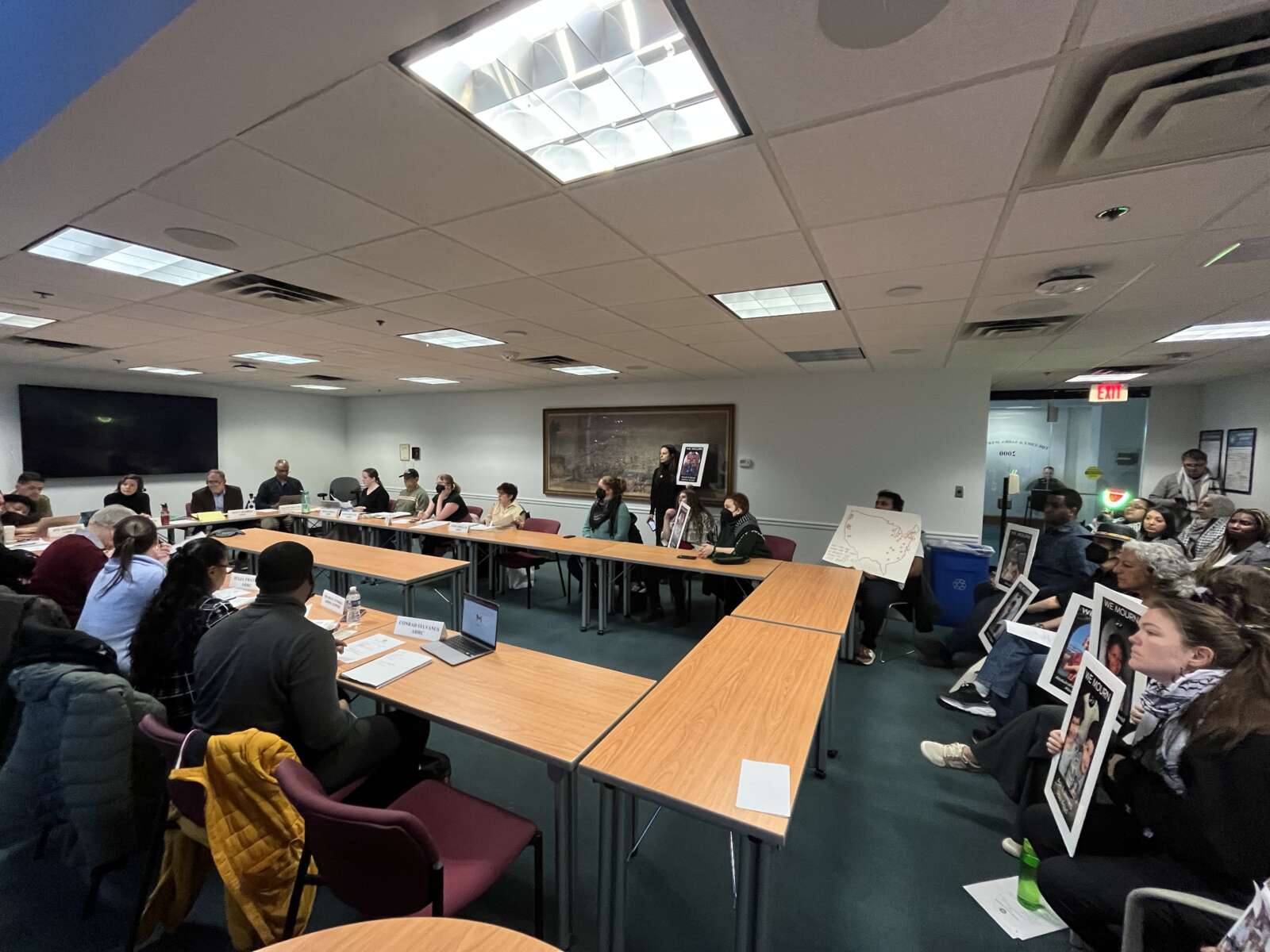
After months of discussion, Alexandria’s Human Rights Commission (HRC) voted in favor of a recommendation that City Council pass a resolution calling for a ceasefire in Gaza.
The workroom in City Hall was packed to standing-room-only with supporters of the ceasefire resolution who have been active for months in both Human Rights Commission meetings and City Council public hearings calling for a ceasefire resolution.
While there have been conflicts between Israel and Palestine for decades, the latest conflict started on Oct. 7 when Hamas attacked Israel, killing around 1,200 people and taking 250 others hostage. After the attack, Alexandria’s City Hall was lit in blue and white in support of Israel.
Alexandria City Hall is lit in the Blue and White as we stand with Israel and against the murderous terrorism of Hamas. pic.twitter.com/qLVwx8Oevr
— Justin Wilson (@justindotnet) October 11, 2023
Since then, Israel’s attack on Gaza has caused extensive civilian casualties and devastated much of Gaza. Several cities around the United States have issued calls for a ceasefire.
There’s been resistance to a ceasefire in Alexandria, however. The HRC had planned to vote on a resolution in February but was told that Commissions cannot pass resolutions and can only make recommendations to the city. The HRC was also told by a member of city staff that three elected officials asked that the HRC not send them a resolution on an international issue.
The HRC held off on voting on the issue until they could meet with the Office of the City Attorney, but a letter sent by City Attorney Cheran Ivery said “given what I have been told transpired at the most recent HRC meeting, I do not believe that would be a productive interaction, so I respectfully decline.
Ivery said in the letter that the HRC does not have the authority to pass resolutions, but that it can communicate its position to the City Council on a topic:
As previously stated in writing, and reiterated to the HRC by staff, it is the opinion of my office that the HRC lacks the authority to pass resolutions. This opinion has nothing whatsoever to do with the subject matter of any proposed resolution. Should the HRC desire to communicate its position to the city council on any topic, it certainly may do so in several different ways,e.g., a letter, report, or memorandum,to name a few mechanisms.
Much of the discussion from the HRC was on crafting language in their recommendation to avoid making it sound too much like a resolution, substituting instances of “request” and “call” to a softer “recommend.”
The final resolution read:
Recommendation to Join Representative Don Beyer in a call for a long-lasting Ceasefire in Gaza
The Alexandria Human Rights Commission accompanies our Jewish and Palestinian residents in their suffering in light of the horrific attacks of October 7th and the catastrophic loss of civilian life that has followed in Gaza. During its last three meetings, the Commission has heard about the extreme emotional pain experienced by Alexandria residents who have strong personal ties to Israel, Gaza, and the West Bank. These residents feel that their voices are not being heard as decisions directly affecting them are made by City, state, and federal officials.
Alexandria is a diverse city that welcomes people hailing from all corners of the globe and practicing all religions. Consistent with the maxim that all human life is precious and must be protected, the City will not tolerate any acts of violence or hatred, including any antisemitic, Islamophobic, anti-Palestinian, or anti-Arab acts against our residents or visitors. Residents may contact the Office of Human Rights if they are aware of any such events or have concerns to express.
After several months of hearing heartbreaking testimony, the Alexandria Human Rights Commission finds it imperative that we recommend the City Council to call for a durable ceasefire. Several cities around the country have adopted resolutions containing similar calls.
The Human Rights Commission of the City of Alexandria recommends that our City Council join us in echoing the call of Alexandria’s U.S. Representative Don Beyer on December 4th for a “durable ceasefire to secure the release of all hostages, a halt to attacks on Israel, the protection of civilian lives in Gaza, and an end to the appalling loss of life from this conflict.”
“This is about right and wrong,” said Matt Harris. “I think we’ve done the right thing here calling for a ceasefire in this terrible situation.”
Others said they regretted how long the process had taken.
“Several of us regret very much how long it has taken,” Tom Reeder said.
The recommendation passed with 13 in favor and one abstaining.
There were around 30 activists gathered at the far end of the room, many of them with signs sharing the names and photos of civilians killed in Gaza.
Comments from the audience expressed appreciation to the HRC for its work, saying the fight will continue with trying to get Alexandria’s City Council to pass a resolution calling for a ceasefire.
“This issue has brought us public participation on an unprecedented scale,” said Marc Bendick Jr. “I hope that you will continue to be active in the city on many issues. Feel free at any time to come to this Commission because you have enriched us in this process.”
A large part of the discussion was also from members of the HRC encouraging activists to continue their work in Alexandria, combating both antisemitism and Islamophobia. Commission members also used the unique level of attendance at the meeting to encourage activists to:
- Apply for vacancies on Alexandria Boards and Commissions
- Volunteer with local non-profit ALIVE!
- Spread word about the Gerry Bertier Scholarship and John Duty Collins III Outstanding Advocate for Persons with Disabilities Award
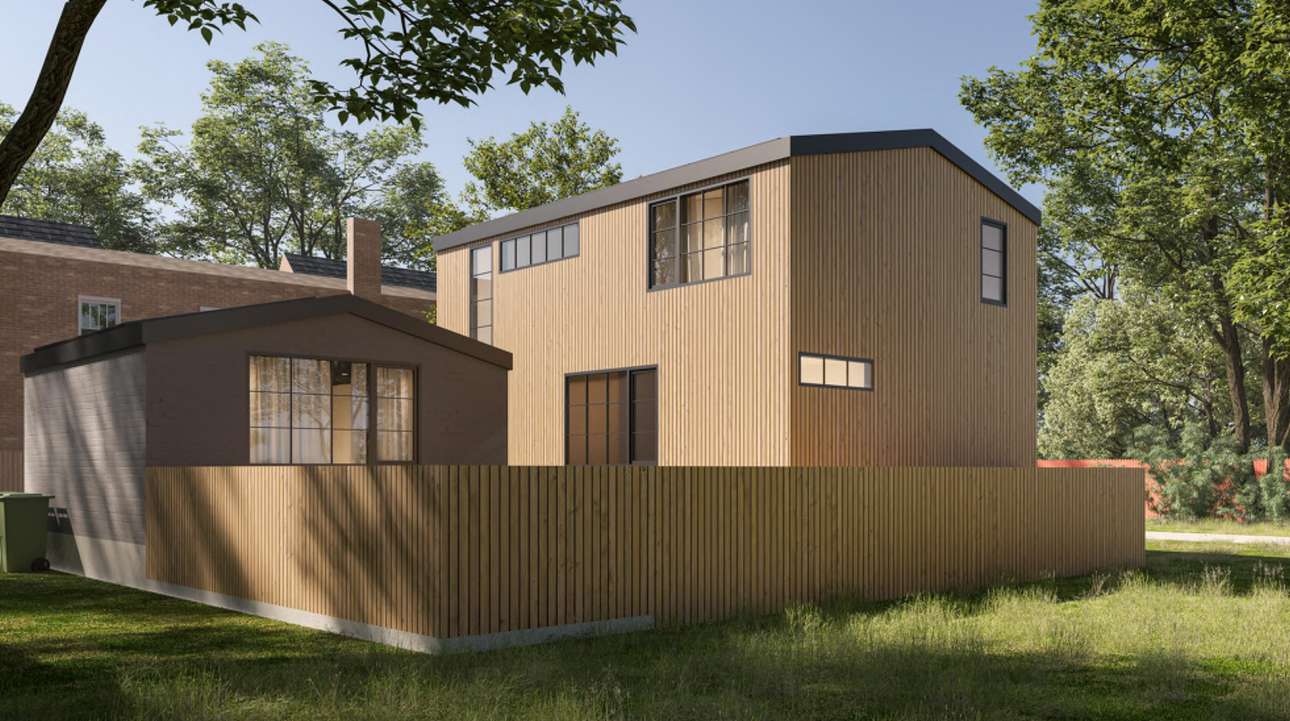
(Updated 9:20 p.m.) After a prolonged battle between a Del Ray homeowner and his neighbors over a proposed accessory dwelling unit (ADU) and a single-family home, Alexandria’s City Council struck the plans down in a meeting earlier this week.
The plan (docket item 11) was to create a two-story, single-unit ADU to 404 E. Alexandria Avenue along with a single-family home. The unit would be set off the main street on a vacant lot and accessible by a public alley.
The plan drew backlash from neighbors from the start. The Del Ray Civic Association recommended denial of the project and residents spoke at the Planning Commission and City Council meeting, expressing concerns about the tree preservation, emergency access, stormwater management and more.
While the Planning Commission recommended approval for the ADU in a divided 4-3 vote, the City Council was unanimous in their denial.
City Council members said the sum of the concerns added up to the development feeling incompatible with the neighborhood.
“Where I’m really struggling is, when I reviewed this case, it says over and over that in order for the SUP approval it has to be compatible with the surrounding neighborhood,” said City Council member Alyia Gaskins. “And then when you look at the staff report, the language that was used was ‘we’re not aware of any lots without the frontage in Del Ray’, ‘this is the first of its kind on the block’, ‘no other contemporary architectural types’ and ‘it’s unique’. For me, that language begins to pull out some of those pieces… it is different in multiple ways.”
City Council members said they didn’t want to discourage ADU development or even slap down unorthodox buildings, but the Council agreed unanimously that this ADU didn’t fit on that Del Ray lot.
“The request to permit a substandard lot is not in and of itself an extraordinary or unique case,” said City Council member Sarah Bagley, who noted that she was still undecided up until the final vote. “I want to be careful about what we think of as ‘well it’s different… and therefore incompatible.'”
Bagley said there’s likely to be more new and innovative designs coming before the City Council in coming years as buildings are reconfigured to, for example, maximize solar panels on the roof.
Bagley ultimately joined her colleagues on the City Council in a unanimous vote to deny the substandard lot application.
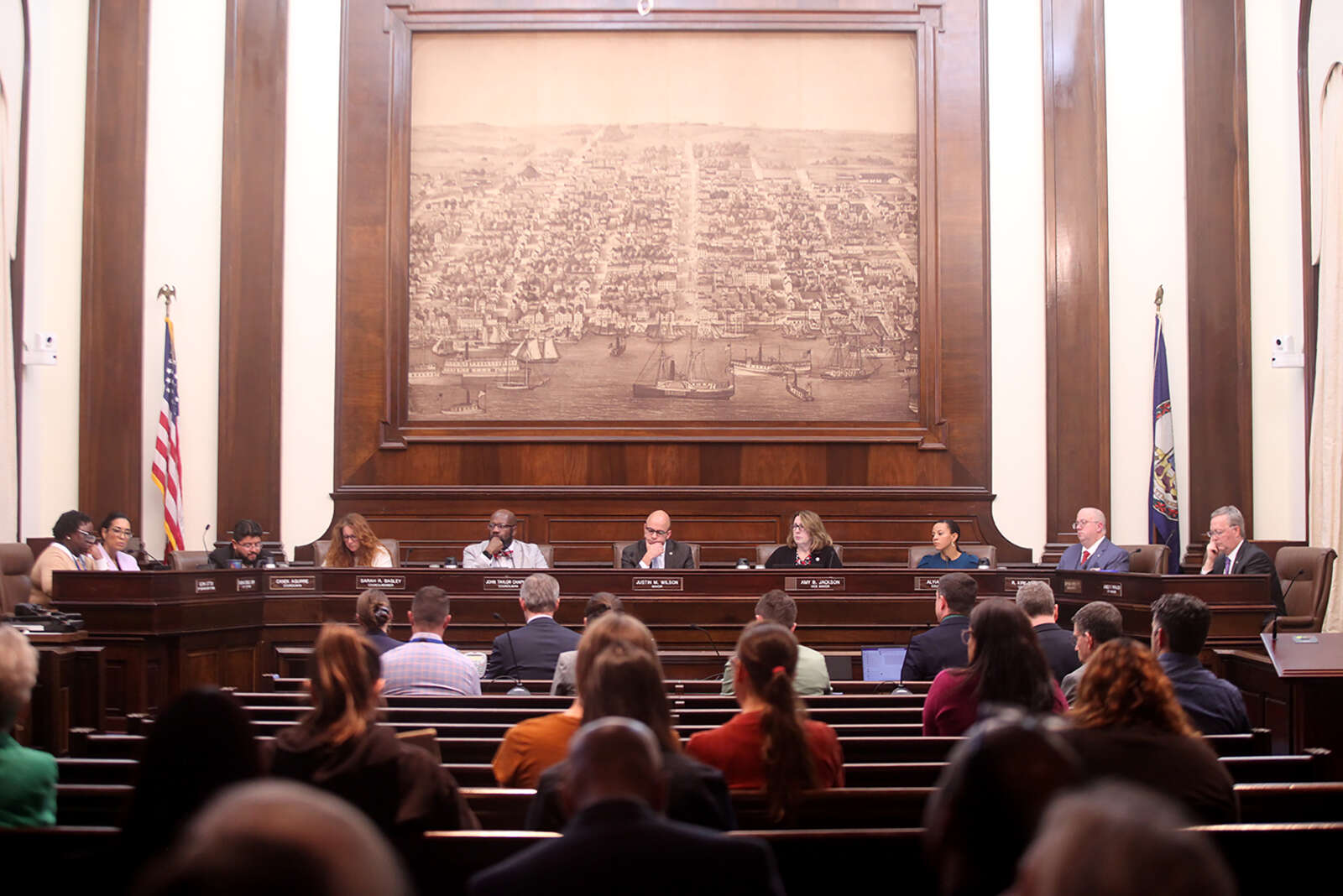
Alexandria’s City Council set a maximum tax rate at 4 cents higher than the current $1.11 tax rate — a significant increase, but less than the 6-cent increase proposed earlier in last night’s (Tuesday) meeting.
The maximum tax rate, as was emphasized several times in the meeting by nearly everyone on the City Council, does not reflect what the tax rate will be in the final budget, it is only the highest tax rate the City Council can possibly go to in its budget.
A 4-cent tax rate increase would bring the tax rate up to $1.15 per $100 of assessed value.
While the City Manager’s proposed budget is based on keeping the current real estate tax rate, a higher maximum tax rate gives the City Council some wiggle room to include other priorities. Notably, a public hearing the day before the maximum tax rate focused primarily on calls for more funding for affordable housing programs and Alexandria City Public Schools.
“This will be a sacrifice no matter what happens in May [in the final budget],” Vice Mayor Amy Jackson said. “This is just the advertised ceiling, not being approved for what will happen. But when we’re hearing; and it was packed here last night listening to the public hearing about affordable housing issues and school issues, we have a lot that our city is challenged with right now. We certainly want a buffer in the coming weeks as we’re trying to make big, bold decisions.”
A 4-cent tax rate increase would be substantial, but not as much as the 6-cent increase proposed by City Council member Canek Aguirre, who said he wanted to set that as the maximum tax rate to make more Alexandrians pay attention to issues affecting the city. A 6-cent increase would bump the City of Alexandria’s tax rate to $1.17 per $100 of assessed value.
At the current tax rate, the Average Alexandria homeowner will see their tax bill go up by $210. A 6-cent tax rate increase would add $420 onto that increase, according to city staff.
According to Aguirre:
We need our community and residents to understand the situation we’re in. We have not been able to find new revenue. We are 20,000 residents larger with staff at the same level as 2010. We have to pay for services. Our schools are asking for more money. We still have a collective bargaining agreement to go with general services staff. We have our own infrastructure buildings for the city that we need to pay for. When we look at DASH, looking to expand service, not reduce. Again, just as a reminder to our residents, whenever we advertise something that doesn’t mean that’s actually what we’re going to do. That’s just setting a maximum cap.
I know six cents is extremely high but I want to signal to residents that we’re in a big situation right now. Admittedly I’ll say even if we don’t do the full six cents, if we choose something else, it may still require an increase after this year.
But the 6-cent increase faced some pushback from other City Council members, who said the maximum tax rate should still be something the Council would conceivably vote for. City Council member Alyia Gaskins said setting a 6-cent maximum may set false expectations for the community.
“I want to be honest though: what gives me pause is we are about to engage in conversations over the next few weeks with our residents… and I want us to go into that conversation with a good faith effort,” Gaskins said. “I wouldn’t want us to advertise something that is so high or so above what we would actually advertise that people come and they would submit ideas that are not going to be considered, because I don’t think that’s fair to their time, I don’t think that’s respectful of their creativity.”
The City Council worked the maximum tax rate down to a 4-cent increase, though the final budget could have a lower tax rate increase, no tax rate increase, or a very unlikely cut to the tax rate.
According to Mayor Justin Wilson
My view is: you raise the tax rate for a capital investment and you live within your means on the operating side. That’s generally what you do, and when you do that, you help yourself in the future. Generally, my view on tax rate increases is heavily dependant on how we’re going to spend the money. Particularly in an environment where you are looking at a really narrow revenue growth for the next several years, unless we are signing up for large tax rate increases every single year for the years to come, then we have to be restrained on the operating side or we’re really setting ourselves up.
Budget hearings will be held throughout March and April with final budget adoption scheduled for May 1.
It was standing-room-only at a City Council budget hearing yesterday (Monday) and most of the speakers had one of two things on their mind: affordable housing and fully funding Alexandria City Public Schools.
The push for more funding to the city’s affordable housing programs came from a mix of housing nonprofit leaders and residents from neighborhoods like Arlandria/Chirilagua staring down the barrel at gentrification.
“We recognize that $12 million for the Housing Trust Fund isn’t enough to reach each affordable housing target,” said Jill Norcross, executive director of the Northern Virginia Affordable Housing Alliance.
Norcross and others called for the city to fund the Community Lodgings redevelopment of Elbert Avenue Apartments and Wesley Housing’s ParcView II development for a total of 464 affordable housing, much of it considered ‘deeply affordable’ — ie for residents at around 40% of area median income or lower income levels.
At least half of those in City Council chambers were there with Tenants and Workers United (TWU), an organization that supports low-income communities of color, immigrants, low-wage workers and more.
“Our families are not part of the city’s growth,” said Ingris Moran, a lifelong resident of Alexandria and community organizer for TWU. “We do not see proactive tools that will stabilize our families and keep our families in the city.”
As the city prepares for redevelopment at the former Landmark site and Potomac Yard, Moran said residents in Arlandria and low-income communities fear displacement. Moran said TWU supports the city investing $10 million to create a voucher program for families earning less than 40% of AMI, investment into the expansion of the guaranteed income pilot, and funding for the aforementioned affordable housing projects.
“The City needs to make bold decisions to make good, sustainable investments,” Moran said. “The City Council supporting funding, creating and expanding these programs would be the City Council supporting working class families in the city.”
Carlos Rubio, an Arlandria resident, said wages have not kept pace with rent increases around Arlandria. Rubio asked the City Council to provide support through rent relief programs.
“Last year I had to leave my apartment where I was living for 20 years,” Rubio said. “I was okay leaving there, but then suddenly I received a rent increase that was way too high for me. It was more than a $400 increase. Now I live in another property, where it’s not that affordable but it is better.”
The other half of the public comment, on the other hand, primarily featured teachers and parents pushing for the City Council to fully fund the Alexandria City Public Schools’ $384.4 million combined budget request by the School Board. That budget has been a battleground for City Council and School Board leadership, with many on the Council expressing displeasure at a lack of long-term planning in the school budget and last-minute budget requests.
Mayor Justin Wilson told the School Board that fully funding that budget would require a six-cent tax rate increase, calling the proposal not viable.
Advocates from the ACPS community said, regardless of the enmity between the boards, the City Council should fully fund the ACPS budget.
“I recognize this city is facing a difficult year, however, without a strong public school system, we run the risk of negatively affecting the entire city,” said ACPS parent Catie Brownback. “As we continue to increase affordable housing options in this city, which we should do, we will also increase the enrollment in our public school system. With the rising cost of living, we can’t expect the budget to stay flat. Please help keep Alexandria a thriving city long-term by fully funding our schools.”

